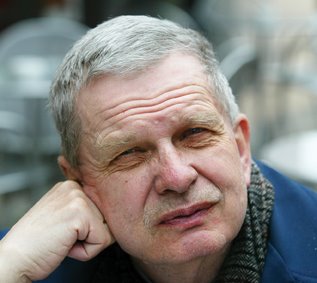“To travel through time, a poem must possess a unique intonation and perception.”
I’d never read the late great Nobel laureate Joseph Brodsky‘s essay on his friend and fellow poet Tomas Venclova (they also shared a common fate, ejected from the U.S.S.R. a few years apart), but last week I rummaged through the Stanford Libraries to find the Lithuanian poet’s Winter Dialogue so that I could find the Brodsky essay, “Poetry as a Form of Resistance to Reality,” which was included as a foreword to the volume.
It didn’t disappoint:
Venclova’s poetry fits this requirement perfectly. His intonation is striking for its restraint and low-key quality, for the conscientious, intentional monotony that seems to be trying to muffle the far too obvious drama of his existence. In Venclova’s poems the reader will not find the slightest sign of hysteria or the slightest insistence on the uniqueness of the author’s fate, an insistence that logically presumes the reader’s compassion. On the contrary, if his poems postulate anything, it is the awareness of despair as a habitual and exhausting existential norm, which is temporarily overcome not so much by an effort of will as by the simple elapse of time.
I have The Junction: Selected Poems, and look forward to comparing its choices with the total collection of Winter Dialogue. In any case, one particular poem, which the poet himself discussed in recent correspondence, has become a particular favorite. From “Tu, Felix Austria” (translated by Diana Senechal):
 Death is not here, she always looms.
Death is not here, she always looms.
The tones of the bells come closer;
she lives in granite, heat, wine,
and bread, in chestnuts entwined
with acacias. She roams
in dreams. History is part
of death. Galileo, not Hegel, was right:
eppur si muove. A dense, charred
sphere revolves into night.
What at first seemed real is just a denial
of time. There is no revival
in sleep. Nothing and clouds extend
through the window. Death
is not here. Death is at hand.
She rides around in the cage of the room,
crosses out the next calendar date,
then looks in the mirror and meets
you face to face.
Brodsky continues in the introduction:
Venclova’s song starts at the point where the voice usually breaks, at the end of exhalation, when all inner forces are used up. In this characteristic lies the exceptional moral value of his poetry, because the ethical focus of the poem is in its lyricism rather than in any narrative element. For the lyrical quality of the poem is in effect a sort of utopia attained by the poet, and it conveys to readers their own psychological potential. In the best circumstances, this “good news” provokes a similar internal motion in readers, moves them toward creation of a world on the level suggested by this news. At the least, it liberates them from dependence on the reality they know, making them aware that this reality is not the only one. That achievement is not small, and it is for this reason that reality holds little love for poets.
Tomas Venclova tells the story of how he was deprived of Soviet citizenship on video here. Curiously, the story involves Algirdas Avižienis, the kindly professor from Kaunas who showed me Czesław Miłosz‘s rural birthplace.
Tags: "joseph brodsky", Algirdas Avižienis, Czeslaw Milosz, Diana Senechal, Tomas Venclova



October 8th, 2012 at 10:22 am
[…] recently came upon Cynthia Haven’s blog, The Book Haven—in particular, a post about the Lithuanian poet Tomas Venclova, with a quotation of my translation of his poem “Tu, Felix Austria” (one of my favorites of the […]